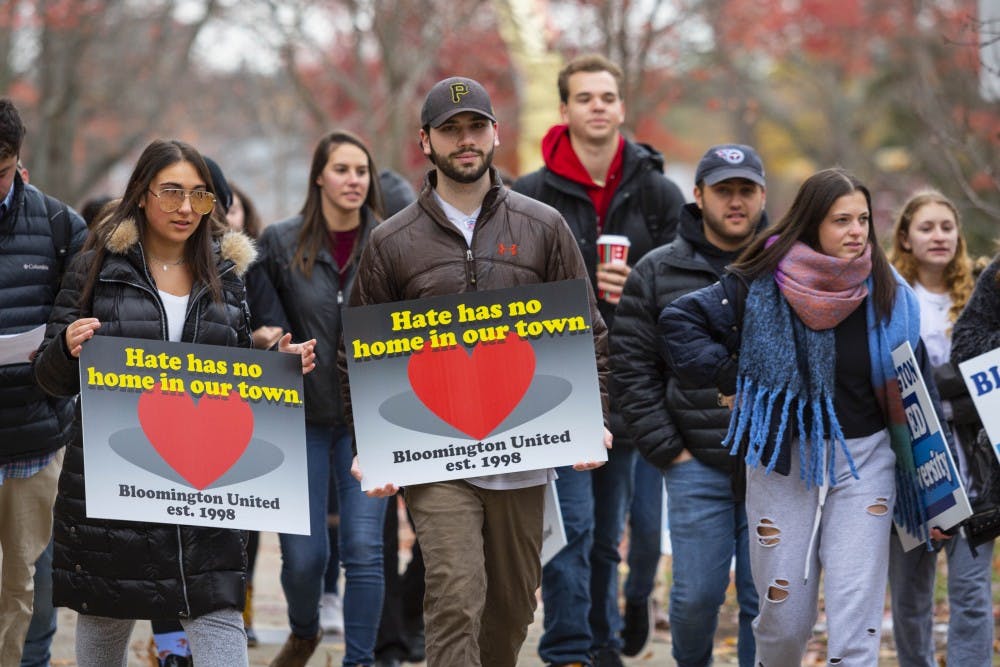An array of public officials and activists gathered at the Indiana Statehouse late Tuesday morning for the Indiana Forward press conference. Indiana Forward is a coalition of over 90 members comprised of nonprofits, religious organizations and universities who seek to pass an effective hate crimes bill during the 2019 legislative session.
In the south atrium, the coalition hosted a variety of speakers, including mayors and legislators from across the state, who expressed their support of comprehensive hate crime legislation.
The passage of hate crimes legislation in Indiana has been a controversial issue since it was first introduced several years ago. Hate crimes legislation, also known as bias-motivated crime legislation, is a framework commonly used in the U.S. to hold those who commit crimes out of a bias against the victim’s race, sexuality, gender identity or other characteristics accountable.
Currently, Indiana is one of only five states without hate crimes legislation. While our lack of hate crime legislation is certainly a moral issue, it is also an impediment to our economic development.
Across the board, business leaders have encouraged Indiana to enact meaningful legislation to address bias-motivated crimes. Some even suspect that our failure to pass hate crimes legislation in 2018 was a primary component in Amazon’s decision not to accept Indianapolis’s bid for the company’s second headquarters.
Though we are only in the second week of the 2019 legislative session, there are already a number of bills in both the House and the Senate designed to improve the sentencing guidelines for bias-motivated crimes. So far, those bills are Senate Bill 12, House Bill 1020, House Bill 1093 and House Bill 1159.
Supporters of bias-motivated crimes are also watching to see if Sen. Susan Glick, R-13, will file another version of the hate crimes bill that she has championed for several years now before the Thursday afternoon filing deadline.
While it’s encouraging to see the issue of bias-motivated crimes taken up again by both Democrats and Republicans in each chamber, one of these bills is dangerously unclear.
House Bill 1093, Bias Crimes, has already become a controversial bill, and for good reason. As the bill is currently written, it allows for additional sentencing to be added for a crime proved to have been committed out of bias against the victims’ perceived “characteristic, trait, belief, practice, association, or other attribute the court chooses to consider.”
In this bill, it’s not so much what the authors say, but rather what they don’t say that is a cause for major concern. This legislation, as currently written, is essentially useless. In attempting to so broadly protect everyone, if passed, this bill would protect no one. Additionally, the use of vague terms like “characteristic,” “trait” and “attribute” without definition also prompts critical questions of constitutionality and applicability.
In authoring this bill, Indiana legislators are attempting to do exactly what Georgia’s legislators attempted and failed to do: avoid the issue of sexuality and gender identity.
In Georgia, when a similarly unclear hate crimes bill was passed by the legislature, the state Supreme Court struck it down unanimously for being too “unconstitutionally vague.” Early versions of that bill did incorporate a list of protected classes, which include gender, race, religion, national origin and sexual orientation. However, the inclusion of protections for sexual orientation caused significant push back from members of Georgia’s legislature, resulting in the bill being watered down simply to get it passed. Consequently, this attenuated version of the bill was rendered valueless by the state Supreme Court, and as a result, valueless to the people of Georgia.
In addition to concerns about constitutionality, the broad use of undefined terms in HB 1093’s language is also problematic. What is a characteristic? How about a trait? An attribute? Raise your hand if you can explain to me the difference. The point here is that if our legislature doesn’t adequately explain their terms, then our courts are tasked with crafting definitions. And for as many different judges there are to read the statute, there are equally as many ways to interpret it.
If Indiana follows Georgia’s example and passes a bill without a list of protected classes, it will be either unconstitutional or inapplicable, if not both.
Hoosiers have been waiting a long time for hate crime legislation, and we deserve comprehensive legislation that can be utilized. While there will undoubtedly be pushback for the inclusion of a list of protected classes, that is a necessary conversation that our legislators need to have together, instead of attempting to evade controversy by proposing a diluted bill. Let’s encourage our legislators to protect all Hoosiers this session by making sure that any hate crime bill that moves forwards includes a list of protected classes.
Visit http://iga.in.gov/legislative/find-legislators/ to find your legislators and let them know your thoughts on Indiana’s hate crime bills.






